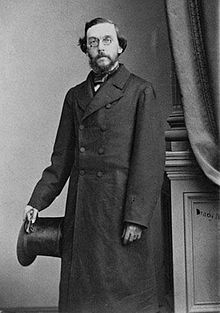Henry Shelton Sanford
| Henry Shelton Sanford | |
|---|---|

Henry S. Sanford in c. 1865
|
|
| United States Ambassador to Belgium | |
|
In office 1861–1869 |
|
| President |
Abraham Lincoln Andrew Johnson |
| Preceded by | Elisha Y. Fair |
| Succeeded by | Joseph Russell Jones |
| Personal details | |
| Born |
Henry Shelton Sanford June 15, 1823 Woodbury, Connecticut |
| Died | May 21, 1891 (aged 67) Healing Springs, Virginia |
| Political party | Republican |
| Spouse(s) | Gertrude Ellen Dupuy |
| Relations |
Nehemiah Curtis Sanford – father Nancy Bateman Shelton – mother |
| Children | Henry Shelton Sanford, Jr. Gertrude Ellen Dupuy Sanford Frida Dolores Sanford Ethel Sanford Helen Carola Nancy Sanford Leopold Curtis Sanford Edwynne Emmeline Wilhelmina McKinnon Sanford |
| Alma mater |
Cheshire Academy Trinity College Heidelberg University |
| Profession | Diplomat, Businessman, Founder of Sanford, Florida |
Henry Shelton Sanford (June 15, 1823 – May 21, 1891) was a wealthy American diplomat, businessman, and from Connecticut who served as United States Ambassador to Belgium from 1861 to 1869. He is also known for founding the city of Sanford, Florida and for successfully lobbying the United States into recognizing King Leopold II's claim to the Congo region in central Africa, the area that would become Leopold's privately controlled Congo Free State.
Sanford was born in Woodbury, Connecticut into a family with deep New England roots. He was the son of Nancy Bateman Shelton (1800–1880) and Nehemiah Curtis Sanford, who made his fortune manufacturing brass tacks and served in the Connecticut Senate for the 16th District. He was a descendant of Governor Thomas Welles, who arrived in 1635 and was the only man in Connecticut's history to hold all four top offices: governor, deputy governor, treasurer, and secretary. He was also the transcriber of the Fundamental Orders. Nehemiah C. Sanford's brother was John Sanford, the founder of the Amsterdam, New York branch of the Sanford family.
Henry Shelton Sanford enrolled in Trinity College in 1839, but did not graduate. Trinity College later conferred on him the degree of L.L.D. in 1849. He was also educated at Heidelberg University, Germany from which institution he received the degree of Doctor of Canon and Civil Law or J.U.D. in 1855. He obtained the title of ‘General,’ which he is often noted by, after donating a cannon battery to the Union in the Civil War.
...
Wikipedia
